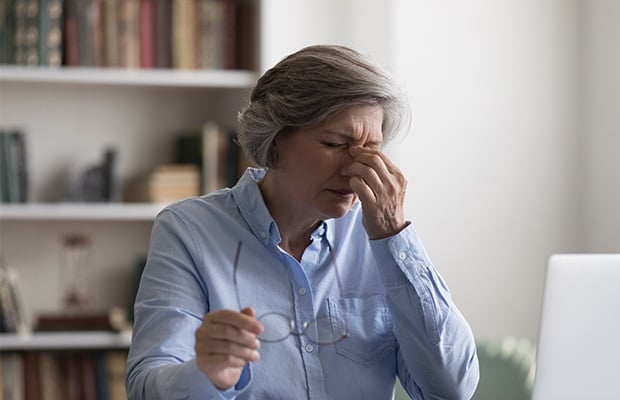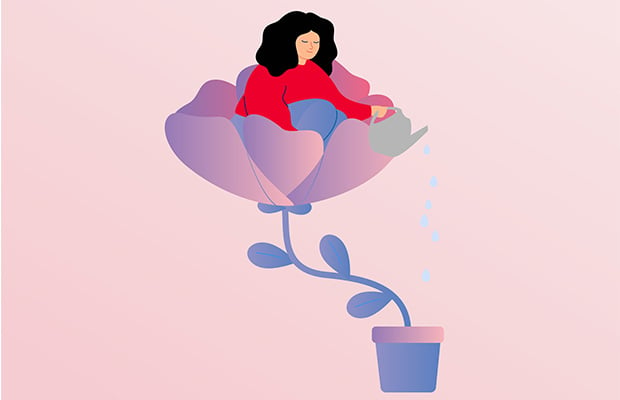4 expert tips on adapting to the new normal
If you find that your cardiac condition has changed your life in some way, you are not alone. Adapting to the ‘new normal’ is likely to take time.
“Many people will experience a level of uncertainty and feelings of loss of control,” says Mina Arvanitopoulou, Lead Clinical Psychologist in Adult Congenital Heart Disease and Cardiology at Guy’s and St Thomas’ NHS Foundation Trust.
Mina has worked with cardiac patients for the last 16 years and has supported hundreds of men and women with the psychological impact of a cardiac event or condition. She has the following tips that can help you adapt to a new normal.
1. Keep up with your support networks
She explains that a sudden cardiac event or diagnosis can be very traumatic and overwhelming and can lead to feeling unsafe or scared.
Talking about your experience to your loved ones is very important
“It makes us aware that life is unpredictable and that we are not invincible,” she says. “This can lead to anxiety or low mood and can cause us to avoid activities or people. You may find yourself withdrawing, avoiding socialising, meeting family or doing your usual activities, especially during the first few months. So it’s important to remember that seeking support and talking about your experience to your loved ones is very helpful.”
2. Accept that you may feel vulnerable
“After a cardiac event some people may feel ‘different’ from others or even somewhat ‘flawed’, and that can affect their confidence. Some people may even feel like a 'fraud' because they may look well on the outside while not feeling well on the inside.
They feel that they should not complain because “other people have it worse” and they do not give themselves permission to process and express their feelings during this very difficult experience. This can also lead to feeling lonely, avoiding friends and their usual support networks.”
Having to cope with new limitations, and not feeling as physically or mentally strong as you did before may leave you feeling vulnerable. Ms Arvanitopoulou says it’s important to remember that feeling vulnerable is perfectly fine and understandable and, in fact, is to be expected after experiencing a potentially serious threat to our lives.
“It’s easy to confuse being vulnerable with being weak, so we should remind ourselves that we can be vulnerable but that this does not mean that we are weak.”
Want to get fit and healthy?
Sign up to our fortnightly Heart Matters newsletter to receive healthy recipes, new activity ideas, and expert tips for managing your health. Joining is free and takes 2 minutes.
I’d like to sign-up
3. Get connected to the things that matter to you
She also recommends getting more connected to the things that really matter to you. This could be spending more time with family or friends, or pursuing a new hobby and activities you enjoy.
She says: “When your life is put on hold by a sudden illness, it gives you time to reflect. With support, and after processing the initial shock or feelings of loss, this experience can also be used as a time in our lives to reconnect with ourselves and our values and we can start appreciating things more. People often find that life then can start to feel more precious, meaningful and colourful.”
4. Be willing to give up some of your responsibilities
She adds that physical limitations after a cardiac condition may affect your sense of identity, especially if you see yourself as a “doer” who has lots of responsibilities and is used to doing things for other people, at home or at work.
You may even find that you sometimes neglect your needs because you tend to prioritise other people’s needs.
She explains: “Therapy can often help us understand the underlying reasons for this need to please others and what we gain from this, which is often the feeling of being useful, needed, appreciated and ultimately loved. By understanding these things gradually about ourselves, we can learn how to increase our self-value and invest our time and energy in a more meaningful way for us.”
Pauline’s story: “There is life after stroke”

Pauline, 60, from London, had a stroke when she was 47, which affected her ability to walk, her balance, and the use of her right arm.
“The stroke changed many things in my life. I was a nurse and I had to give that up. Some of my friends stayed in touch but others stopped involving me in things. I couldn’t cook or dance – I love music and dancing. My mouth turned to one side and my speech was affected. I couldn’t balance or use my right hand and I felt too shy to see people. For about a year I just stayed at home, staring out of the window, and I became depressed.
There were several different things that helped me adapt to my new way of life and that improved my mood and my confidence. I had to re-learn how to walk, using a stick for support. My physiotherapist encouraged me to get stronger and to get more confident about leaving home.
I went from being stuck inside the house to doing lots of different activities
I started going to a church where one of my sons knows the pastor. After the service we would have tea and chat, and that helped me meet new people. I joined the London Stroke Choir, which meets at a local college, and that helped me a lot. I started to see that it’s not the end of my life, and I started making new friends there. Singing, as well as speech therapy, helped me with my speech.”

“I’ve got three sons – they are so supportive, so that was my happiness and joy. My youngest son, Oluseyi, who is training to be a nurse, lives with me and helps me with everything in the house I can’t do anymore, like shopping and cooking.
Some of us from the choir started going to a pool to do aqua aerobics, with people in the pool helping us. That helped me build strength, but it also helped with the social side as well, because it was new people to talk to who had been through something similar.
I also found new opportunities that I wouldn’t have done before. I joined an arts show with an organisation called Rosetta Life, who work with artists and health professionals to help people like me express our feelings. We did a show called Stroke Odysseys with musicians and dancers, and we toured the UK. It helped bring back my confidence.
I have my family, my church, and new friends I have made. I went from being stuck inside the house to doing lots of different activities. I just want to advise people who have had a stroke that they should not give up – after stroke there is life. When you come out of hospital, move on, fight for it – you’ll get there one day.”
5 readers share their tips on how to adjust

1. Learning how to self-care
“I live with heart failure and the realisation that life is not the same depressed me at first. But I saw it as an opportunity to change the things that stressed me mainly by saying ‘No sorry I can’t do this now, but I can later’, or not feeling guilty for sitting and having a rest. Good support from family and friends helps, and so does not being afraid to ask for help.
Susan Webb, 71 from Bedfordshire
2. Embracing a healthier lifestyle
“Since my heart attack and quadruple bypass, I've become aware of how important a healthy lifestyle is. I am conscious about what I eat, and I go for long power walks everyday.”
Paul Whitehouse, 65, from Birmingham
3. Exercising at home
“I have an arrhythmia and chronic obstructive pulmonary disease, which makes me breathless, so I must take it easy and do a 20-minute warm up before exercising. But I have attached my beloved mountain bike to a training attachment in my spare room. I can set it from 1 to 6 on the gears and I feel much happier and more confident. I can stop and rest when I feel I need to and workout as I feel I need to. A new lease of life for me.”
Tarina La Rue, 65, from Leicestershire
4. Discovering how to slow down
“My life has changed since I was diagnosed with left ventricular insufficiency, which means the left ventricle of my heart can’t pump blood around my body as well as it should. I have slowed down considerably, especially when walking a distance, upstairs, or uphill.
“I manage by taking it easy and resting for a few seconds along the way. In some ways I think my heart condition has slowed me down to a good standard of living now. Before, I was rushing through life without thinking of the important things like family, friends, and looking at nature and listening to the birds as I walk.
“I’m a retired nurse and a colleague once said to me: “Better to be five minutes late in this life rather than five minutes early in the next. ”What a great statement - it changed my life for the better.”
Mary Armstrong, 71, from Liverpool
5. Adjusting to gentler sporting challenges
“I’ve always been physically active but since having a heart attack and developing atrial fibrillation I decided after speaking to my cardiologist to get an electric bike so I could carry on doing my beloved hills without putting any long-term strain on my heart. It was expensive but the best thing ever
“I now take nothing in life for granted but believe that being proactive in dealing with your own health is vital. I walk, cycle, go to the gym, exercise at home, and play golf. I also eat healthily and get plenty of good-quality sleep. I no longer set myself very difficult fitness or adventure challenges but by taking it a bit easier life can still be enjoyed to the full.”
Roger Williams, 71, from Nottingham
We want to hear from you
Did you find any of the tips in this article useful? Do you have other suggestions of how to adapt when your health changes your lifestyle? Email your thoughts and any photos for a chance to be featured in the next magazine.










